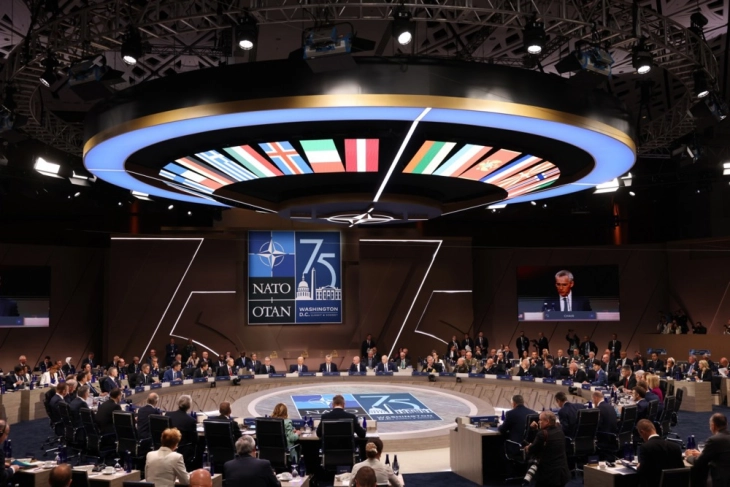NATO leaders pledge €40 billion military aid to Ukraine in next year
- NATO leaders on Wednesday pledged €40 billion ($43 billion) worth of military aid to Ukraine in the next year and declared the country's path to NATO membership "irreversible."
- Post By Silvana Kocovska
- 09:13, 11 July, 2024

Washington, 11 July 2024 (dpa/MIA) - NATO leaders on Wednesday pledged €40 billion ($43 billion) worth of military aid to Ukraine in the next year and declared the country's path to NATO membership "irreversible."
Leaders from NATO's 32 member states reached the agreement on the second day of a three-day summit in Washington, after a celebration of the alliance's 75th anniversary on Tuesday.
The plan to spend €40 billion in 2025 was proposed by NATO's outgoing Secretary General Jens Stoltenberg at a foreign ministers' meeting in Prague in May. However, Stoltenberg had wanted NATO members to make a multi-year commitment to Ukraine in order to show Russia it cannot win the war by waiting for Western support to wither.
Instead, the funding will be reviewed next year, Stoltenberg said in a press conference on Wednesday.
"We have agreed that €40 billion is a minimum baseline within the next year and to ensure sustainable funding for Ukraine to prevail," Stoltenberg said. "We also agreed to review this at our summit in 2025, not least to ensure it continues to meet Ukraine's needs."
The summit declaration published on Wednesday also says allies will continue to support Ukraine's "irreversible path to full Euro-Atlantic integration, including NATO membership." It affirms that "Ukraine's future is in NATO."
However, the declaration also underscores that Ukraine can only join when all current members agree. The United States and Germany in particular are against rushing the process, diplomatic sources within the alliance said. But other NATO member states want to demonstrate that Russia cannot put the brakes on Ukraine joining NATO by waging war against the country.
The declaration welcomes Ukraine's "concrete progress" on "its required democratic, economic and security reforms," since the last NATO summit in the Lithuanian capital Vilnius a year ago.
NATO has accepted the idea of Ukrainian membership in principle since 2008, while Ukraine has had its NATO membership ambitions enshrined in its national constitution since 2019.
Alongside the €40 billion pledge, NATO leaders also agreed to launch a project that will see the alliance coordinate military support and training for Ukraine for the first time.
The project, called NATO Security Assistance and Training for Ukraine (NSATU), is expected to launch on Friday.
Until now, NATO countries have been coordinating support to Ukraine through an informal, US-led group called the Ukraine Defence Contact Group. NSATU will see NATO itself formally coordinate support.
NSATU aims to put NATO allies' support for Ukraine "on an enduring footing," according to the NATO declaration. "NSATU will not, under international law, make NATO a party to the conflict," it stresses.
The summit declaration also calls on China to cease "all material and political support to Russia's war effort." China "cannot enable the largest war in Europe in recent history without this negatively impacting its interests and reputation," says the declaration.
On the sidelines of the summit, the United States, the Netherlands and Denmark issued a joint statement saying that the promised transfer of US-made F-16 fighter jets from the Netherlands and Denmark to Ukraine is now under way.
During an event at the Ronald Reagan Foundation in Washington on Tuesday, Ukrainian President Volodymyr Zelensky said that Ukraine was hoping to receive the first F-16s this summer. He said his country needs at least 128 fighter jets, as Russia could deploy 300 aircraft per day. Zelensky is also attending the summit.
US President Joe Biden on Tuesday opened the summit by announcing that NATO allies would supply additional air-defence systems to Ukraine.
Arriving at the summit venue on Wednesday, newly appointed British Prime Minister Keir Starmer told reporters he had met Zelensky to assure him that the change of government in Britain would not affect the country's support for Ukraine.
Starmer added that the Washington summit was an opportunity for the country's new centre-left Labour government to reaffirm its commitment to NATO.
The United States and Germany also issued a joint statement on Wednesday announcing that the US will station long-range cruise missiles in Germany, in order to strengthen NATO's military deterrent in Europe.
The statement said "episodic deployments" of the long-range missiles will begin in 2026.
The summit is Stoltenberg's last as secretary general. Former Dutch prime minister Mark Rutte is set to take over in October.
On Thursday, NATO leaders will hold a formal meeting with Zelensky to further discuss the alliance's support for Ukraine.
Photo: EPA







